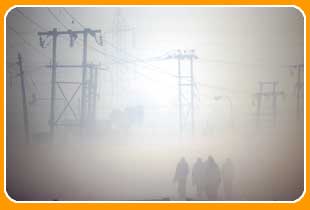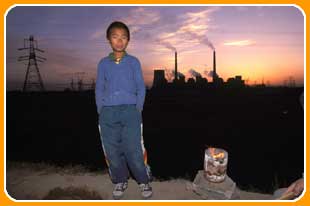Many cities are being choked by a cocktail of dust and chemical particles in the air. Every day 1.5 billion people are exposed to levels of air pollution well over the safety limits recommended by the World Health Organisation. Air pollution actually shortens lives. Three million people die each year from poor air quality.

© Chris Stowers/Panos Pictures |
Children under five are especially vulnerable, and health problems in childhood can continue into later life, like here in Taipei, Taiwan's capital city. |
Unlike other urban problems, no city dweller can escape air pollution, and nearly everybody adds to the problem. Yet 90% of the victims live in poor countries. Here, cities are growing faster, producing more pollution in a shorter time span.
The Big Smoke
|
© Michael Fresco/Rex Features |
Air pollution is not new. 700 years ago, air pollution from burning coal was recognised as a problem in London. Stricter measures were introduced in the 1950s when smog - combining smoke from homes and fog - had lethal consequences. Four thousand people died and many others suffered breathing difficulties and other illnesses. Today, London is still the most polluted capital city in the European Union after Athens.
Where does the pollution come from?
 |
to find out. |
What's the air quality like in your area? Find out from www.airquality.co.uk
If you want more information on air pollution in cities visit www.doc.mmu.ac.uk/aric/eae/Air_Quality/Older/Urban_Air_Quality.html

© Daniel O'Leary/Panos Pictures |
One of the worst cases of air pollution took place in South Asia during August 2002. A blanket of pollutants nicknamed, "the Brown Cloud" smothered large parts of the region, causing severe problems for the people there. Imagine you are a journalist who was sent to South Asia to report on the situation. Write an article based on what you found out. |
Clearing the Air
| With so many demands on city planners, air pollution can drop down their list of priorities yet some cities are taking action.
Visit these cities to find out what they are doing. Which plan is most likely to work? What might be some of the drawbacks of these plans? |

© Mark Henley/Panos Pictures |





